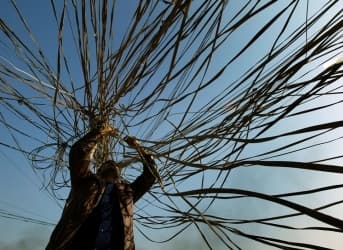Beirut, the “Paris of the Middle East,” has one problem that the City of Light does not – electricity shortages. In a country whose complex politics frequently produce gridlock, concerns about the country’s shambolic electrical infrastructure have become a political football.
Lebanon’s consumption exceeds 2,400 megawatts, far greater than the 1,500 megawatts produced and the country currently faces a generating shortfall of 1,000 megawatts, leading to widespread blackouts and rising political unrest. The failure of the current government to grapple with the problem has resulted in demonstrations in south Lebanon, the Chouf and the Bekaa regions.
Endemic power cuts have worsened during the past month as maintenance work on several electrical production units has increased the shortages. Energy Minister Jibran Bassil has responded to his increasingly vociferous critics by arguing that the power shortages have been caused by the negligence of previous governments as well as insufficient investment in the country’s electricity sector. Last year, the cabinet approved Bassil’s electricity plan to allocate $1.2 billion to the Energy Ministry with the proviso that the funds be transferred in installments and that the government oversees the project to increase the nation’s electricity output by 700 megawatts but little has been accomplished up to now.
So in the interim, on 1 February the Lebanese cabinet decided to lease power-generating ships to help reduce the country’s severe electricity rationing. Energy Minister Jebran Bassil praised the decision, telling reporters, “What happened yesterday was a good gesture by the government in terms of reforming the electricity” sector.
Where will the ships come from?
Turkey – among the vessels to be leased is the Karadeniz Powership Rauf Bey, which can generate 232 megawatts of electricity.
Another offer of foreign assistance has been treated more cautiously. Last week Lebanese Foreign Minister Adnan Mansour met with Iranian Ambassador Ghazanfar Roknabadi, who gave him a letter from Iranian Foreign Minister Ali Akbar Salehi, which contained a proposal to help Lebanon resolve its severe electricity shortages. Mansour said that Iran has expressed readiness to provide Lebanon with 200-400 megawatts of electricity “at a competitive and preferential price.” According to Roknabadi, Iran has an energy surplus of 6 billion kilowatt hours and “The agreement was proposed in the days of President Mahmoud Ahmadinejad’s (visit to Lebanon) last winter and we are still waiting for a response from Lebanon.”
The issue of Iranian assistance is a political minefield, as Lebanon’s rival political factions are bitterly divided on Iran’s relationship with the country. The March 14 coalition criticizes Tehran’s backing of Hezbollah and is agitated over the March 8 alliance’s close ties with the Islamic Republic.
In the long term, Lebanon’s electrical woes can only be solved by building more power stations, a process that requires a year for constructing plants that produce 500 megawatts and two years for transformers that produce 1,000 megawatts.
The future?
On 30 January Prime Minister Najib Mikati said that Lebanon was close to launching a previously approved plan to end power shortages in the country, highlighting during a Twitter session that a transparent mechanism ought to be adopted for implementing the proposal, tweeting, “As much as I am keen on implementing an electricity plan as soon as possible, I am also keen on transparent mechanisms for competitive financing, which will be subject to monitoring.”
ADVERTISEMENT
In the meantime, the electrical shortage is producing rich ammunition for the government’s foes. Lebanese Forces leader Samir Geagea has urged Thursday Prime Minister Najib Mikati’s government to resign, telling a news conference at the Lebanese Forces headquarters in Maarab, north Beirut, “Nothing supports the presence or the survival of this government. Lebanon is currently experiencing its worst period in six years. Was any progress made (in terms of) electricity? Telecommunications? The economic situation? Anyone who respects himself inside this government should resign.”
By. John C.K. Daly of Oilprice.com


















